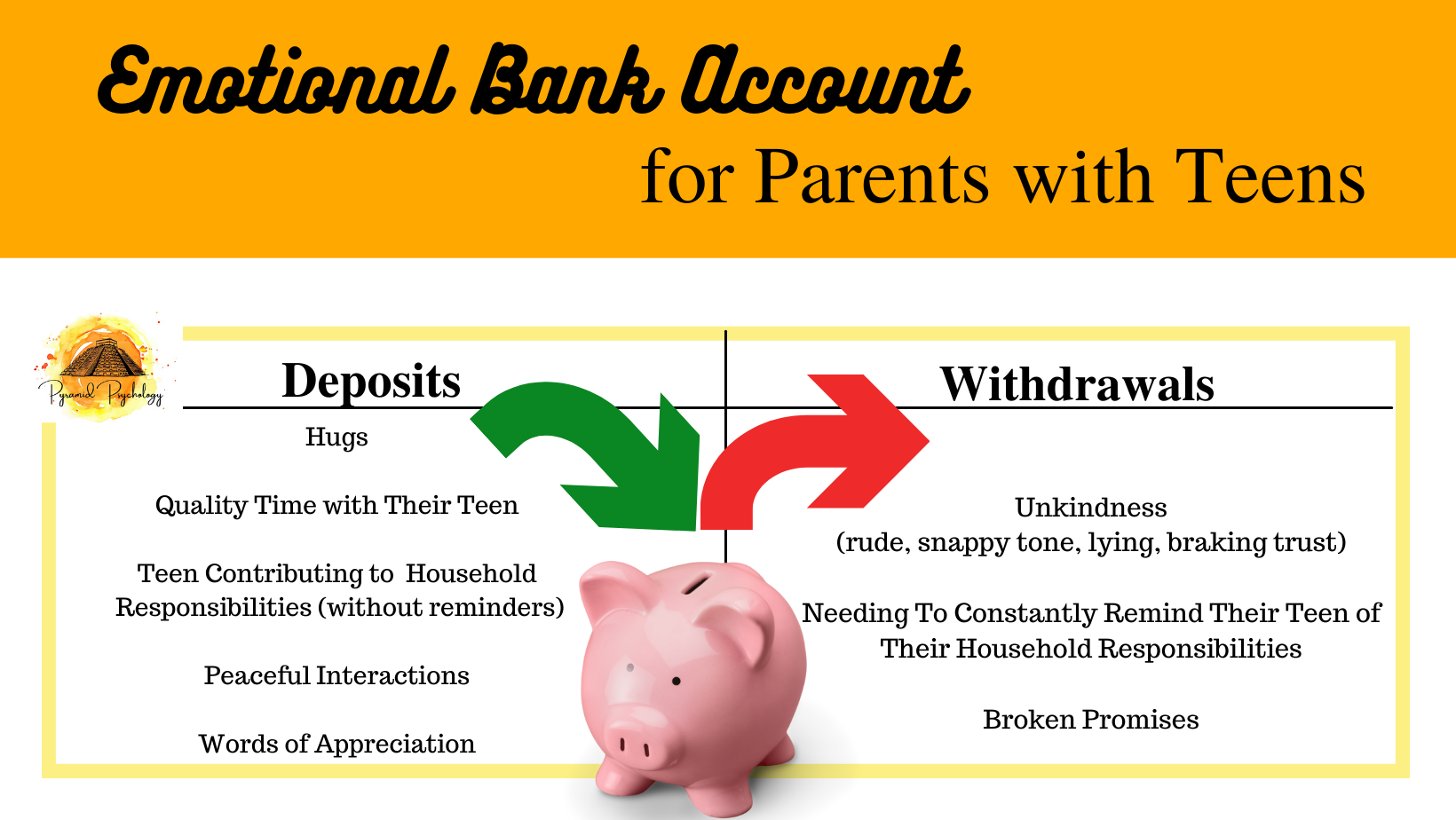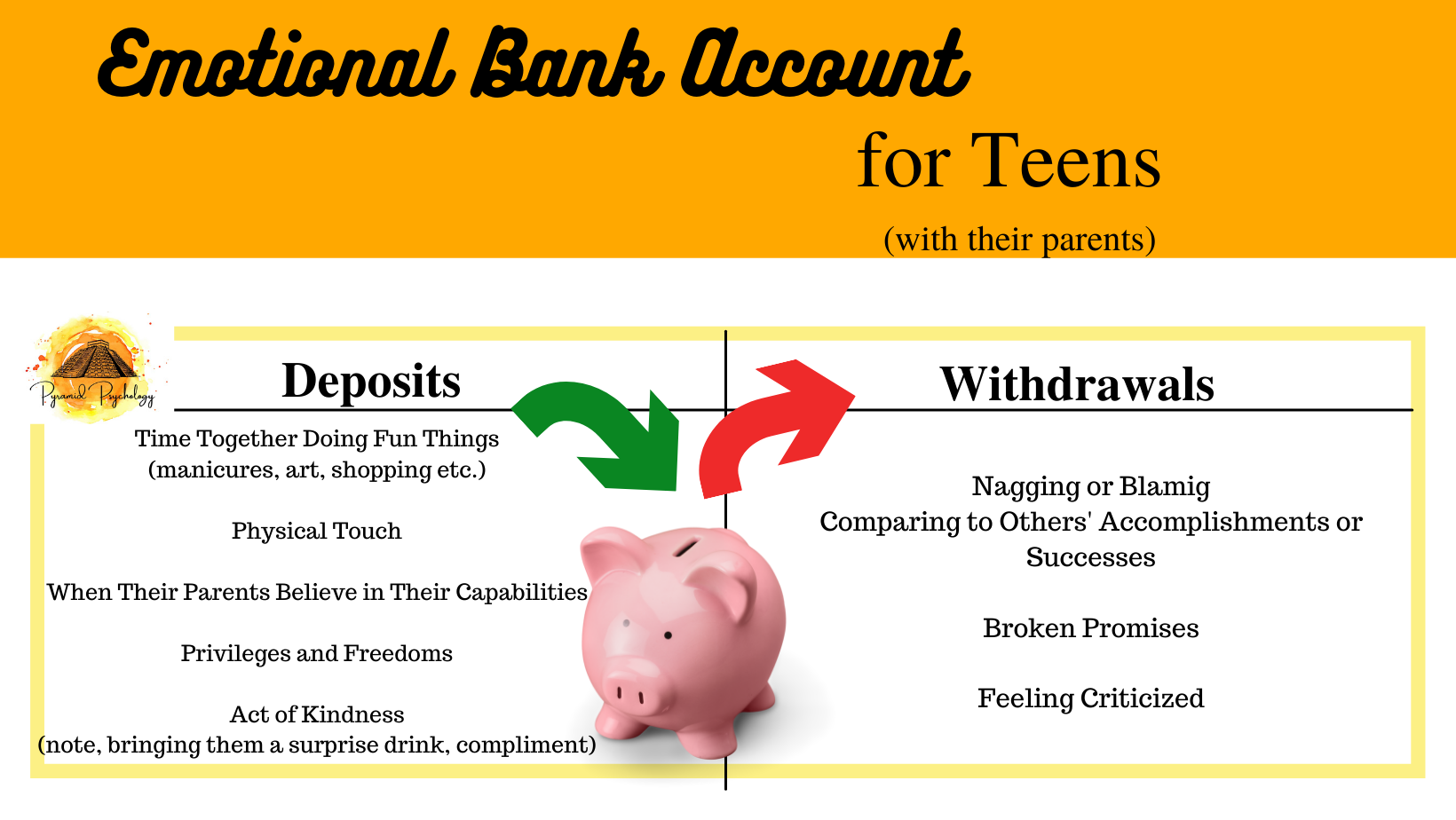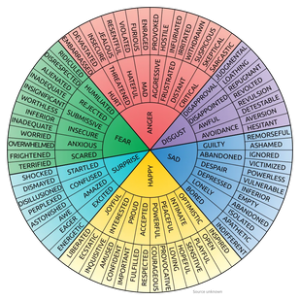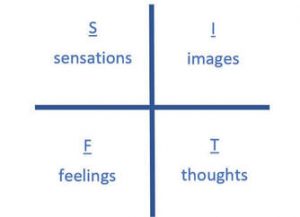Emotional Bank Account: Your Relationship With Your Teen
In Dr. John Duffy’s book, Parenting Your New Teen in the Age of Anxiety – he shares about the ‘Emotional Bank Account’. This is a theory around relationships, and some of the things that contribute and support those relationships, as well as some of the things that might break them down. It is a theory that is shared in a few different well known books, such as Stephen R Covey’s The 7 Habits of Highly Effective People, or Dr. Gary Chapman’s book on the 5 Love Languages.
The idea is that every person has their own, unique – and invisible – Emotional Bank Account (EBA). And each bank account has personal forms of deposits and withdrawals into/out of it. Parents and teens will have different things that deposit or withdraw from their EBA.

Photo from Canva Pro
When each person’s bank account is in the green (or in the black as some say) that means the relationship is stronger; it can handle some of the withdrawals that happen in relationships, without too much damage. As a parent, you may be able to “play your parent card” as Dr. Duffy mentions, meaning have more sway with certain expectations and behaviours when your EBA is higher on the deposit side.
The EBA is fluid so it is constantly changing from day to day. And this means, you can always take actions to make deposits or lower the overdraft.
If the account is already bare minimum, or in the red, then different things that are considered withdrawals – behaviours or words – will be more of a hit to the relationship.
As parents, it’s really important to have an awareness of what your teens’ Emotional Bank Account looks like. Are there more deposits, or withdrawals in their EBA right now? How is the EBA balance going to affect the types of interactions you have, if something goes wrong, or doesn’t work out as they thought?
Deposits and Withdrawals for Parents
Each person will have unique things they consider deposits to the relationship. Deposits can be things people say or behaviours, things another person does (or doesn’t) do. Dr. Chapman’s 5 Love Languages are a great example of different things people can consider a deposit. Things such as words of affirmation – “I see you did really great on this project” – or physical touch, giving your teen a hug or painting each other’s nails.
Each person has to figure out for themselves what their deposits (and withdrawals) look like. As a parent, it’s key to start thinking about it – you can try asking yourself – What are some things in relation to my teen that feel like deposits? What are some of the things that make our relationship stronger? When do I feel at my best in our relationship?
You may find that spending quality time with your teen is an important deposit for you. Or, maybe seeing them complete a chore or task/responsibility without you reminding them is your $1000 ticket. Consider what kind of interactions contribute to the deposits.
a chore or task/responsibility without you reminding them is your $1000 ticket. Consider what kind of interactions contribute to the deposits.
It’s important for parents to figure out what their deposits are; what are the things that leave them feeling good about their relationship with their teen. Deposits will continue to nurture the relationship and healthy attachment.
On the other side of things, it’s also key to figure out what withdraws from your Emotional Bank Account. When you’re feeling drained, or the relationship with your teen is getting strained, what is happening? Is it a sassy tone? Chore left undone? Clothes on the floor? Experiencing a lot of push back from your teen?
Below are some examples of withdrawals or deposits as a parent with a teen; every parent and every teen will have their own list of behaviours and actions on their lists.

Deposits and Withdrawals for Your Teen
As you become more aware of your own Emotional Bank Account’s withdrawals and deposits, it’s important to consider what that looks like for your teen as well. You may enjoy spending quality time with your teen; that’s a deposit into your bank account. But what does that look like for your teen? Do they feel the same way, or are they perhaps more inclined to receive from affirming words that they are doing something really well? Hearing you say “Wow, I see how hard you worked on this project” could be a bigger deposit for your teen.
How can parents find the answers to their teen’s EBA??
Get your teen thinking about this too – introduce them to the idea of the Emotional Bank Account. Check out the things your teen sees as a deposit and as a withdrawal. – I’ve heard teens talk about withdrawals as when their parents are nagging them, don’t believe they are telling the truth, compare them to others, or judge their friends.
Parents and teens can work together to know one another’s EBA’s, and help make them be in the green most of the time, rather than in the red.
Like parents every teen will have a different set of deposits and withdrawals. Here is a photo with some examples of an Emotional Bank Account for Teens:

Checking In With Yourself
Once you have a sense of your Emotional Bank Account, you can check in with yourself. Using my EBA to check-in with myself really helps me when I am parenting – asking myself “where are we at with our EBA accounts?”
For example, I can feel myself getting frustrated when chores aren’t being done, so I end up asking over and over (does this ever happen to you?). My teen gets frustrated in turn and so the conflict begins – “I’ll get it done, Mom! Stop asking! (again… ever happen to you?)

Photo by Nathan Dumlao on Unsplash
If I notice the dishwasher needs to be done – I see the dishwasher needing to be emptied, and I get an urge to tell my teen(again) that dishes are piling up and my stress is also… Instead, I pause for a minute and think about my last five interactions with my teen. Were there times when I was nagging, or checking in on homework, etc.? (Things he considers a withdrawal.)
If the answer to that question is ‘yes’, then I pause for a minute and do some things that are more deposit based – if the dishwasher isn’t done now, it will be okay to wait another half an hour (it will get done!)
I invest in the relationship first, and then the dishwasher still gets done.
So instead of going upstairs and asking my teen “hey, why isn’t the dishwasher done yet”, I go up and ask “hey, what are you watching-is it that new anime from last week here?” Then I can check back in on the dishwasher in a little bit and the response will be very different..
As John Duffy explains it – as parents, we sometimes have to use the ‘parent card’ to trump some things, implement consequences, or pursue certain expectations – but it is received in a different way if the Emotional Bank Accounts are in the green instead of in the red.
Emotional Bank Accounts are a great tool to build a positive, healthy relationship with your teen.
Love,
Chantal
 Chantal Côté (she/her) is a psychologist and teen life coach living in Calgary, Alberta. After over a decade in non-profit and community mental health, Chantal started Pyramid Psychology, a practice dedicated to supporting teens – a population she is constantly amazed by. Chantal is on a mission to help 100,000 teen girls (and their parents) build bulletproof mindsets so they can weather the ups and downs of life. As part of this goal, Chantal has had the privilege of speaking at various events – virtual and live – to support teens and parents.
Chantal Côté (she/her) is a psychologist and teen life coach living in Calgary, Alberta. After over a decade in non-profit and community mental health, Chantal started Pyramid Psychology, a practice dedicated to supporting teens – a population she is constantly amazed by. Chantal is on a mission to help 100,000 teen girls (and their parents) build bulletproof mindsets so they can weather the ups and downs of life. As part of this goal, Chantal has had the privilege of speaking at various events – virtual and live – to support teens and parents.
Outside of this passion, Chantal is often in nature, writing poetry, playing ball hockey and hanging out with her loved ones.
Each week, Chantal writes a blog article in response to issues she hears from the parents and teens she connects with. If you have something you’d like to read more on – email ideas and questions to info@pyramidpsychology.com or DM us via Instagram or Facebook.





























































